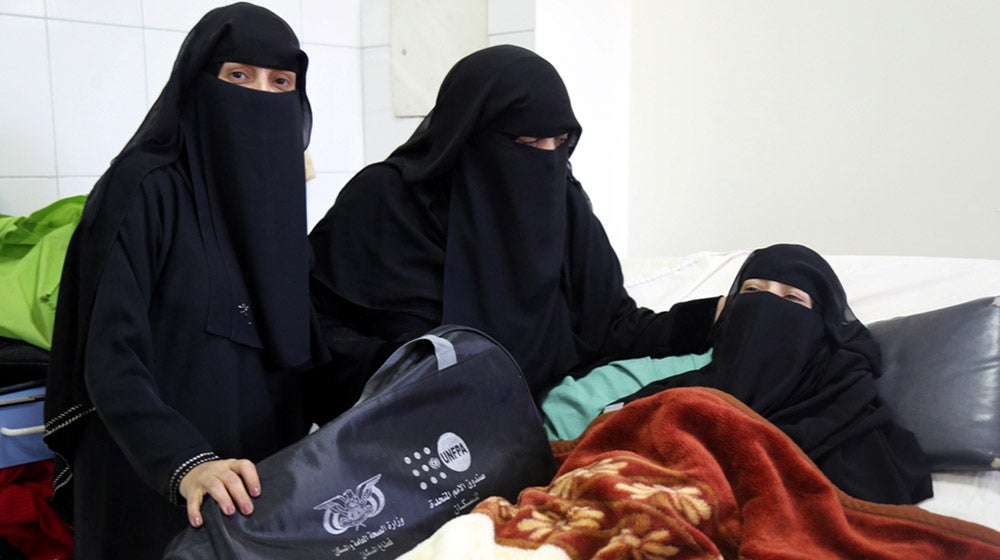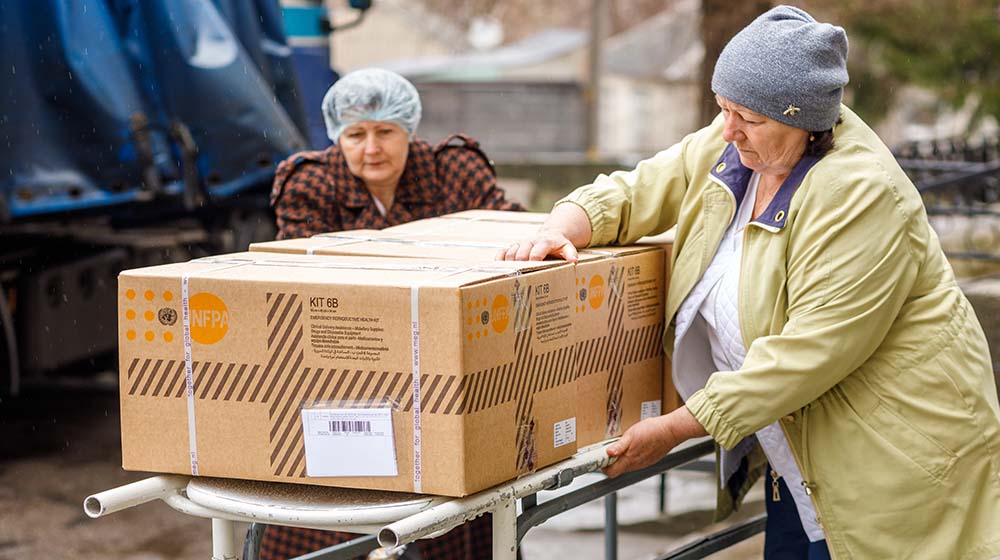BALTI, Republic of Moldova/TAIZZ, Yemen/Port-au-Prince, Haiti/UNFPA, New York – “I caught the last evacuation train, and the next day the train station was bombed,” Katya told UNFPA, the United Nations sexual and reproductive health agency.
Seven months pregnant and suffering from kidney stones, she fled Ukraine for Moldova. There, she received UNFPA-supported maternity services and gave birth to a son – without her husband. “I can’t wait for the day when he can hold our baby in his arms,” Katya said.
Katya’s story is one of millions around the world – stories of pregnant women and new mothers needing life-saving care, girls in precarious conditions desperately seeking to avoid pregnancy, adolescents escaping sexual violence, and more.
UNFPA works with partners around the world to address these critical needs. A two-year review of its current strategic plan showed that, from 2022 to 2023, UNFPA supported safe childbirths for 2.4 million women — including Katya — in humanitarian crisis-affected countries.
Globally, UNFPA prevented an estimated 31.2 million unintended pregnancies. Some 64,730 maternal deaths were averted during this timeframe.
But meeting these needs is becoming more challenging. The years from 2021 to 2023 were the three most violent the world has seen since 1989, according to recent research. Climate change impacts, misinformation, populism and polarization have all further contributed to an environment of grave uncertainty.
Across the world, advances in sexual and reproductive health and rights are also, after decades of consistent progress, beginning to stall. By some measures, such as rates of maternal death, progress may even be reversing.
Amid these warning signs, international funding for sexual and reproductive health and rights is not keeping pace with the growing needs. After reaching a high in 2010, funding recently dropped (one report shows the per-woman investment fell from $7.21 to $6.84 between 2020 and 2021).
“Funding shortfalls and increased insecurity continue to put the lives of these women and girls at risk,” UNFPA Executive Director Dr. Natalia Kanem said to Member States at a UNFPA Executive Board meeting in early June. “Their plight is just one of many crises that have fallen from the headlines.”
Delivering amid uncertainty
UNFPA remains committed to achieving its three transformative results — its goals to end preventable maternal deaths, end unmet need for family planning, and end gender-based violence, including harmful practices.
Achievements made over the last 30 years – when governments agreed, at the International Conference on Population and Development in Cairo, to place individuals’ rights at the centre of development efforts – show that rapid and wide-reaching progress in sexual and reproductive health is possible.
Since 1990, the number of women using modern contraceptives has doubled. Since 2000, maternal deaths have declined by a third, and the coverage of essential health services increased by more than 50 per cent.
Looking ahead, accelerating the pace of progress will require unflagging efforts, particularly in humanitarian settings where needs are high and growing .
Such efforts are essential to people like Judline, a nurse in Port-au-Prince, Haiti, a city riven with gang violence, where delivering care is a constant struggle. Judline visited displacement camps in 2022 and 2023 for UNFPA. “I see myself as a bearer of hope, an immediate ear for vulnerable women and girls who are crying out for help,” she told colleagues.

Accountable to women and girls
Despite the challenges, the review shows that UNFPA continues to deliver. From 2022 to 2023, the work of UNFPA helped save 273,500 girls from female genital mutilation, for example, and 11.5 million sexually transmitted infections were averted.
Dr. Kanem presented these results at the United Nations Headquarters in New York, emphasizing that “my senior management team and I remain unwavering in our commitment to upholding the highest standards of accountability and transparency.” She added, “UNFPA upholds zero-tolerance for any form of wrongdoing or abuse – [these] run counter to our core values, and have no place at UNFPA.”
Ambassador Cornel Feruţă, of Romania, cited trust and credibility as “key values” underlying UNFPA’s results, contributing to the organization’s continued donor support. In the end, he said, “it’s not just about the figures. Every unit is linked to a human being, a human life.”
These are people like Laila*, one of the estimated 18,600 women and girls with obstetric fistula reached with UNFPA-support treatment in 2022 and 2023.
Laila struggled for days to deliver at her home in Taizz, Yemen. Women from around the village tried to help pull the baby out – all without success. Eventually, Laila’s husband brought her to the local hospital for a Caesarean section; their baby was stillborn.

The prolonged obstructed labour caused an obstetric fistula that left her incontinent and shunned by her community.
“Society saw me as an animal, not a human being,” she told UNFPA, which was able to secure a complex fistula repair operation for her at the USAID-funded Al Sadaqa Hospital. But thanks to her recovery, Laila said, “I feel alive again.”
*Name changed for privacy and protection


